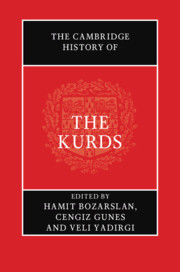Book contents
- The Cambridge History of the Kurds
- The Cambridge History of the Kurds
- Copyright page
- Contents
- Figures
- Maps
- Tables
- Contributors
- Acknowledgements
- Abbreviations
- Additional material
- Introduction
- Part I Historical Legacies
- Part II Regional Political Developments and the Kurds in the Twentieth and Twenty-First Centuries
- Part III Domestic Political Developments and the Kurds in the Twentieth and Twenty-First Centuries
- Part IV Religion and Society
- Part V Kurdish Language
- Part VI Art, Culture and Literature
- Part VII Transversal Dynamics
- 32 A People beyond the State
- 33 Kurdish Transnational Indigeneity
- 34 Kurdish Diaspora
- 35 The Women’s Movement in Kurdistan-Iraq
- 36 A Struggle within a Struggle
- Index
- References
34 - Kurdish Diaspora
A Transnational Imagined Community
from Part VII - Transversal Dynamics
Published online by Cambridge University Press: 13 April 2021
- The Cambridge History of the Kurds
- The Cambridge History of the Kurds
- Copyright page
- Contents
- Figures
- Maps
- Tables
- Contributors
- Acknowledgements
- Abbreviations
- Additional material
- Introduction
- Part I Historical Legacies
- Part II Regional Political Developments and the Kurds in the Twentieth and Twenty-First Centuries
- Part III Domestic Political Developments and the Kurds in the Twentieth and Twenty-First Centuries
- Part IV Religion and Society
- Part V Kurdish Language
- Part VI Art, Culture and Literature
- Part VII Transversal Dynamics
- 32 A People beyond the State
- 33 Kurdish Transnational Indigeneity
- 34 Kurdish Diaspora
- 35 The Women’s Movement in Kurdistan-Iraq
- 36 A Struggle within a Struggle
- Index
- References
Summary
Although the presence of the Kurdish diaspora is relatively new in the European contexts, it has nonetheless developed as a transnational community, enabled and facilitated by global communication technologies that can be used to politically mobilize resources in support of the Kurds in the Middle East. What makes the Kurdish diaspora a politicized diaspora is the persistent exclusionary and violence of the states against the Kurds in Turkey, Iraq, Syria and Iran. It is during times of crisis and critical events that the Kurdish diaspora is materialized through its claims, lobbying and rallies across the West. Although migration can imply assimilation for many transnational communities, the Kurdish ambivalence vis-à-vis assimilation becomes tangible. It is also true that Kurds might be more receptive to assimilation due to their minoritized backgrounds in the country of origin and experiences of adaptation to the dominant culture and language. However, the political activism of diaspora and the strong attachment to Kurdish identity due to political oppression in the Middle East is a persistent reminder that Kurds have not come to the West to assimilate but to continue struggling for recognition of their identities and rights in the Middle East.
Keywords
- Type
- Chapter
- Information
- The Cambridge History of the Kurds , pp. 848 - 868Publisher: Cambridge University PressPrint publication year: 2021
References
- 1
- Cited by

